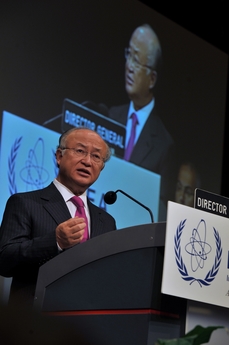The first day of the International Atomic Energy Agency’s five-day Ministerial Conference on Nuclear Safety saw Member States adopt a declaration calling for improvements to global nuclear safety.

IAEA director general Yukiya Amano's address to the conference focused on five key areas: stronger safety standards, more frequent safety reviews at nuclear installations, more independent national nuclear regulation, enhanced global emergency preparedness and.
On safety Amano told the conference: “We need to strengthen IAEA safety standards and to ensure that they are universally applied.”
Amano has asked for the IAEA’s commission on safety standards to review the relevant standards and to report within 12 months, with recommendations for strengthening them. The standards for review will include those pertaining to multiple severe hazards such as tsunamis and earthquakes, effective preparedness for prolonged station blackouts, the assured availability of water for cooling, special protection for plants with multiple reactors, and the cooling of spent fuel under severe accident conditions.
On his second point, safety reviews at nuclear installations, Amano said that the IAEA peer reviews should be carried out after the national safety reviews ‘to add credibility and transparency.’
Amano said that with a system based on random selection, the Agency could conduct an international safety review of one nuclear power plant in ten throughout the world over, say, a three -year period. The knowledge that any plant could be subject to review would give operators an additional incentive to implement the highest safety standards, he said. The IAEA should aim to start this new system within 12 to 18 months, according to Amano.
Amano’s third point concerned national regulatory bodies, which he said: “must be genuinely independent, adequately funded, and staffed by well-trained personnel.”
In the case of Japan, Amano said he would like a new regulatory review mission to take place in 2012 as a follow-up to the 2007 mission. (Japan has not yet implemented all the recommendations from the previous mission, chairman of the Nuclear Safety Commission of Japan recently told Kyodo News in an interview.)
Accident management
An area where Japan has been internationally criticized is in its management of the Fukushima Daiichi accident and the dissemination of information.
Amano told the conference that the mechanisms for responding to and managing a nuclear incident need to be enhanced, both within countries and at the regional and international levels. He said that national accident response teams should be established in all states with nuclear power programmes.
The IAEA mission to Japan presented its preliminary findings. One of these was that “the Japanese accident demonstrates the value of hardened on-site Emergency Response Centres with adequate provisions for handling all necessary emergency roles, including communications.”
The IAEA could have a role to play as well; Amano said the agency would be prepared to establish an international register of special technical expertise - in robotics or fire-fighting, for example - which it could offer to a country which suffers an accident.
Finally Amano suggested that the IAEA’s role in an accident could be expanded from simply distributing information to adding in analysis and possible scenarios of how a crisis might develop.
“I suggest that our information-sharing function should be expanded to include providing analysis and possible scenarios on how a crisis might develop and the associated radiological impact. We could either develop our own capacity or make arrangements with collaborating institutes.”
Amano said that the International Nuclear and Radiological Event Scale (INES), which classifies nuclear incidents on a seven-point scale proved to be ‘an ineffective communication tool’ in the case of the Fukushima Daiichi accident. The INES advisory committee is considering ways in which the scale might be improved.




